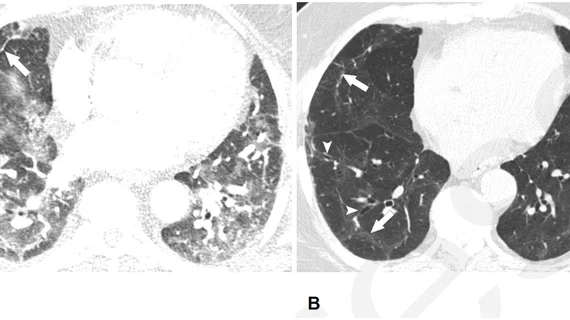More than half of long COVID patients have abnormalities on chest imaging
More than half of patients experiencing long COVID display pulmonary abnormalities on imaging for months after their initial recovery.
This latest evidence was recently shared at CHEST 2022—the annual meeting of the American College of Chest Physicians. At the meeting, co-author of the new study Stephen Goertzen, DO, of Brooke Army Medical Center in Houston, shared that 55% of patients with available chest CT exams at least three months after their initial COVID recovery displayed multiple pulmonary pathologies [1]. However, these findings did not correlate with the results of the patients’ pulmonary function or exercises tests, the authors explained.
"Other than radiographic findings, there were no unified findings that could shed further light on the effects of COVID-19 that would predispose an individual to ongoing symptoms," Goertzen and colleagues shared.
To date, 63 patients have enrolled in the study, 29 of whom have completed high resolution chest CT imaging. Patients included in the study were screened for cardiopulmonary disease prior to their participation, and all those enrolled were said to have experienced ongoing exertional or respiratory symptoms for at least three months following their initial COVID diagnosis.
Of the patients with available chest imaging, 55% showed evidence of pulmonary abnormalities three months (or more) after their initial infection. Those abnormalities were most often described as nodular patterns (38%), mosaic attenuation (34%), residual ground glass opacities (28%) and septal thickening (14%).
Thirty-six of the study participants have also undergone pulmonary function tests (PFT) and a six-minute walk test. Researchers noted that none of these participants desaturated below 90% during the walk test and the PFTs also resulted in normal mean values.
“Pulmonary function testing and impulse oscillometry showed no statistically substantive physiologic derangements that might explain the ongoing symptoms of the group evaluated,” the authors wrote.
Patients involved in the research are continuing to undergo testing, but the results of the work thus far add to the growing body of evidence that even healthy individuals are not immune to the effects of long COVID, the authors suggested.
To view the study abstract, click here.

